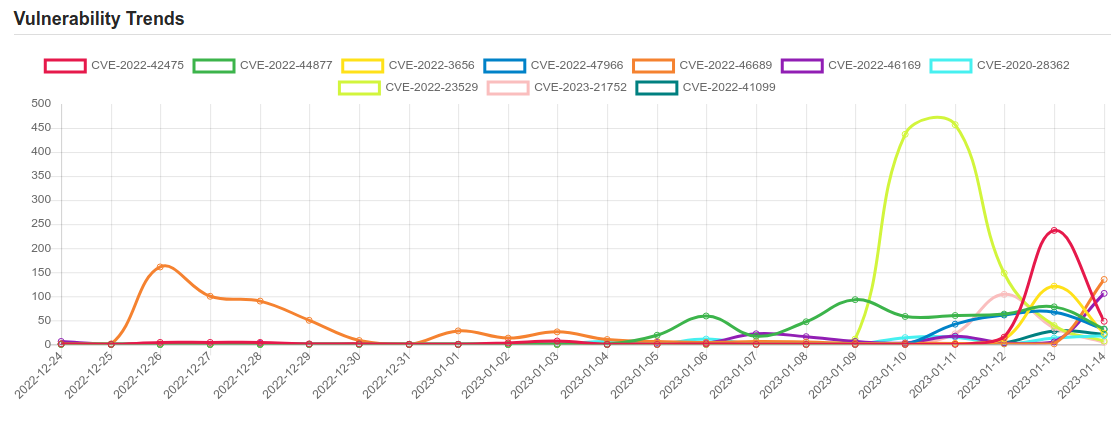Daily Vulnerability Trends: Sun Jan 15 2023

| CVE NAME | CVE Description |
| CVE-2022-41099 | BitLocker Security Feature Bypass Vulnerability. |
| CVE-2023-21674 | Windows Advanced Local Procedure Call (ALPC) Elevation of Privilege Vulnerability. |
| CVE-2022-41080 | Microsoft Exchange Server Elevation of Privilege Vulnerability. This CVE ID is unique from CVE-2022-41123. |
| CVE-2020-6418 | Type confusion in V8 in Google Chrome prior to 80.0.3987.122 allowed a remote attacker to potentially exploit heap corruption via a crafted HTML page. |
| CVE-2022-41049 | Windows Mark of the Web Security Feature Bypass Vulnerability. This CVE ID is unique from CVE-2022-41091. |
| CVE-2023-20025 | No description provided |
| CVE-2023-21746 | Windows NTLM Elevation of Privilege Vulnerability. |
| CVE-2022-41082 | Microsoft Exchange Server Remote Code Execution Vulnerability. |
| CVE-2022-20452 | In initializeFromParcelLocked of BaseBundle.java, there is a possible method arbitrary code execution due to a confused deputy. This could lead to local escalation of privilege with no additional execution privileges needed. User interaction is not needed for exploitation.Product: AndroidVersions: Android-13Android ID: A-240138318 |
| CVE-2022-4233 | A vulnerability has been found in SourceCodester Event Registration System 1.0 and classified as problematic. Affected by this vulnerability is an unknown functionality of the file /event/admin/?page=user/list. The manipulation of the argument First Name/Last Name leads to cross site scripting. The attack can be launched remotely. The associated identifier of this vulnerability is VDB-214591. |
| CVE-2022-4232 | A vulnerability, which was classified as critical, was found in SourceCodester Event Registration System 1.0. Affected is an unknown function. The manipulation of the argument cmd leads to unrestricted upload. It is possible to launch the attack remotely. VDB-214590 is the identifier assigned to this vulnerability. |
| CVE-2022-42475 | A heap-based buffer overflow vulnerability [CWE-122] in FortiOS SSL-VPN 7.2.0 through 7.2.2, 7.0.0 through 7.0.8, 6.4.0 through 6.4.10, 6.2.0 through 6.2.11, 6.0.15 and earlier and FortiProxy SSL-VPN 7.2.0 through 7.2.1, 7.0.7 and earlier may allow a remote unauthenticated attacker to execute arbitrary code or commands via specifically crafted requests. |
| CVE-2022-3656 | Insufficient data validation in File System in Google Chrome prior to 107.0.5304.62 allowed a remote attacker to bypass file system restrictions via a crafted HTML page. (Chromium security severity: Medium) |
| CVE-2022-47966 | No description provided |
| CVE-2022-46689 | A race condition was addressed with additional validation. This issue is fixed in tvOS 16.2, macOS Monterey 12.6.2, macOS Ventura 13.1, macOS Big Sur 11.7.2, iOS 15.7.2 and iPadOS 15.7.2, iOS 16.2 and iPadOS 16.2, watchOS 9.2. An app may be able to execute arbitrary code with kernel privileges. |
|
A considerable amount of time and effort goes into maintaining this website, creating backend automation and creating new features and content for you to make actionable intelligence decisions. Everyone that supports the site helps enable new functionality.  To keep up to date follow us on the below channels.     |


